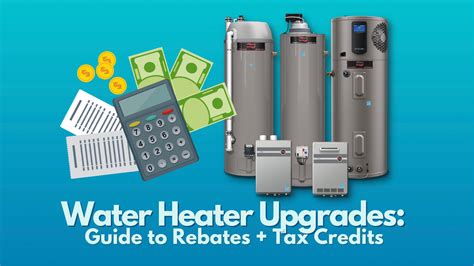As we step into 2025, homeowners are increasingly looking for ways to reduce their monthly expenses while also being environmentally conscious. One of the most effective strategies to not only save money but to also promote energy efficiency is by upgrading your water heater. With various rebates and incentives available, there has never been a better time to make the switch. This article delves into how you can save big by taking advantage of water heater rebates while slashing your energy bills.
Understanding Water Heater Rebates
Water heater rebates are financial incentives provided by governments, utility companies, or manufacturers to encourage homeowners to install energy-efficient water heaters. These rebates can significantly lower the upfront costs associated with purchasing and installing a new unit, making energy-efficient options more accessible. The primary goal of such programs is to reduce energy consumption and promote the use of eco-friendly appliances.
Types of Water Heaters Eligible for Rebates
Not all water heaters qualify for these rebates. It’s essential to know which types of units are typically eligible:
- Tankless Water Heaters: These heat water on demand and are highly energy-efficient.
- Heat Pump Water Heaters: These use electricity to move heat from one place to another, rather than generating heat directly.
- Solar Water Heaters: Utilizing solar energy, these are among the greenest options available.
- High-Efficiency Storage Water Heaters: Traditional models that meet specific efficiency ratings may also qualify.
How to Access Water Heater Rebates
Accessing water heater rebates can be simple, but it requires some research. Here are the steps you should follow:
- Research Available Programs: Check both federal and state programs along with local utility rebates. Websites like the Energy Star and DSIRE provide valuable information.
- Choose an Eligible Water Heater: Make sure the unit you select meets the necessary qualifications for rebates.
- Install through a Certified Installer: Some rebates require installation by certified professionals, so ensure you hire someone who meets this criterion.
- Submit Paperwork: Keep your receipts, installation documentation, and any other required forms for rebate applications.
- Follow Up: After submitting your application, be proactive in following up to ensure you receive your rebate.
Benefits of Switching to Energy-Efficient Water Heaters
Aside from the immediate financial relief from rebates, switching to an energy-efficient water heater comes with several benefits:
- Reduced Energy Bills: Energy-efficient models consume less electricity or gas, which translates to lower monthly bills.
- Lower Environmental Impact: Using less energy not only saves money but also contributes to a reduction in carbon emissions.
- Increased Property Value: Energy-efficient appliances are appealing to potential buyers, enhancing the resale value of your home.
- Longer Lifespan: Many energy-efficient models are built with higher quality components, leading to fewer repairs and a longer lifespan.
Slashing Your Energy Bills Beyond Rebates
While water heater rebates provide an excellent opportunity to save upfront costs, there are additional strategies to consider for further savings on your energy bills:
- Regular Maintenance: Schedule regular check-ups for your water heater to keep it functioning at optimal efficiency.
- Insulate Your Water Heater: Adding insulation can drastically reduce heat loss, enhancing efficiency.
- Adjust the Thermostat: Lowering the thermostat setting to 120 degrees Fahrenheit can save energy without sacrificing comfort.
- Utilize Off-Peak Energy Rates: If your utility company offers reduced rates during off-peak hours, consider running heavy-usage appliances during these times.
Conclusion
In conclusion, 2025 presents a significant opportunity for homeowners to save money by taking advantage of water heater rebates and switching to energy-efficient models. With the potential for reduced energy bills, lower environmental impacts, and enhanced property value, making the investment in a new water heater is both a financially savvy and responsible decision. By understanding the available programs and following the steps to claim your rebate, you can unlock substantial savings and enjoy a more sustainable lifestyle.
FAQs
1. What is a water heater rebate?
A water heater rebate is a financial incentive provided by utility companies, manufacturers, or government programs to encourage homeowners to purchase energy-efficient water heaters.
2. How much can I save with water heater rebates?
The amount saved varies by state and utility provider but can range from a few hundred dollars to over a thousand, depending on the type of water heater and the efficiency rating.
3. Do I need to hire a professional for installation to qualify for a rebate?
Many rebate programs require installation by certified professionals to ensure compliance with efficiency standards, so it is advisable to hire a qualified installer.
4. Are there federal tax credits available for energy-efficient water heaters?
Yes, the federal government sometimes offers tax credits for energy-efficient home improvements, including water heaters. Always check for the most current information and eligibility requirements.
5. Can I combine rebates with other incentives?
In many cases, you can combine local, state, and federal incentives. However, it’s crucial to review specific program guidelines to see if stacking is allowed.
This HTML code provides a complete article formatted for WordPress, including headings, paragraphs, lists, and sections for conclusion and FAQs. You can copy and paste this code directly into a WordPress editor that supports HTML.
Download Water Heater Rebates 2025
